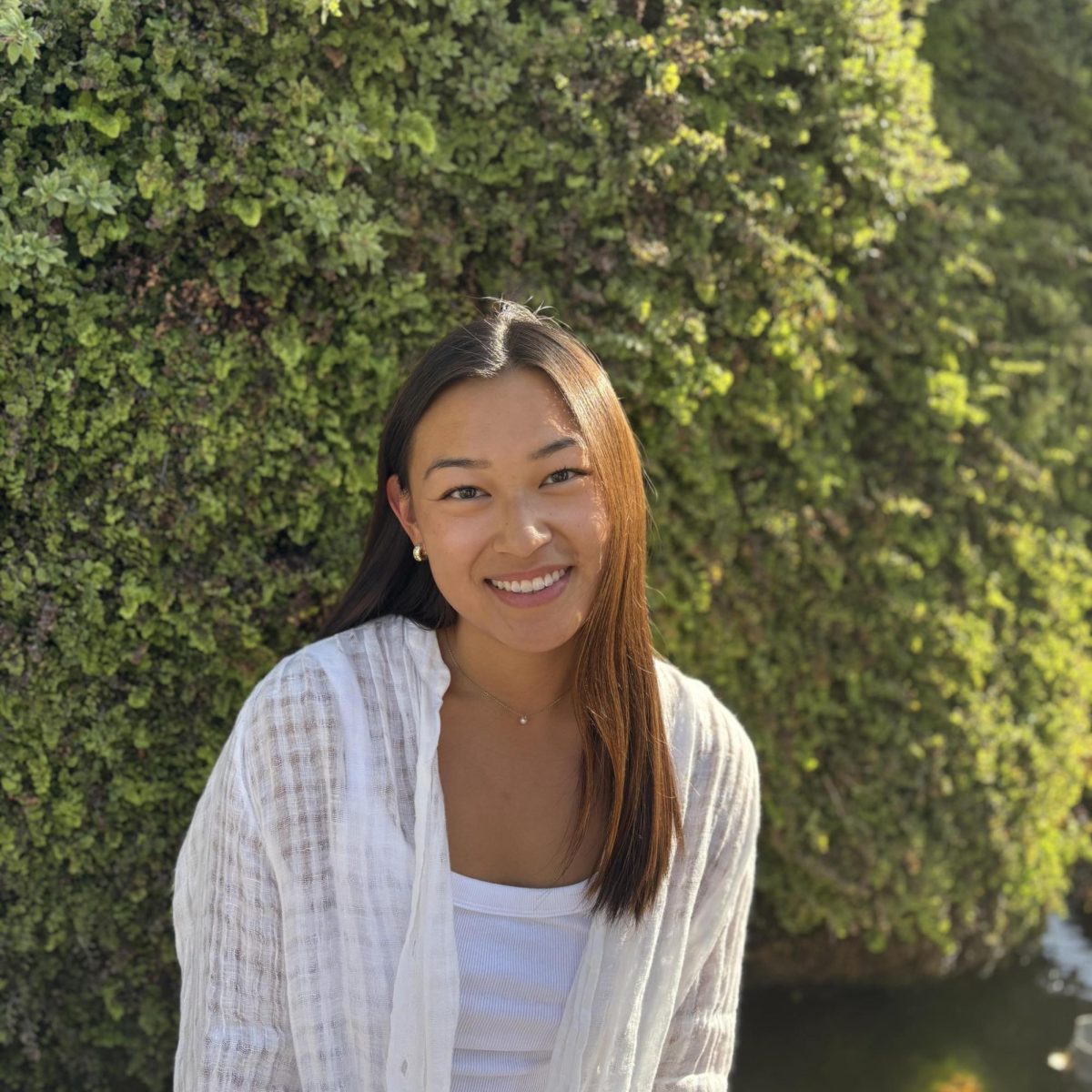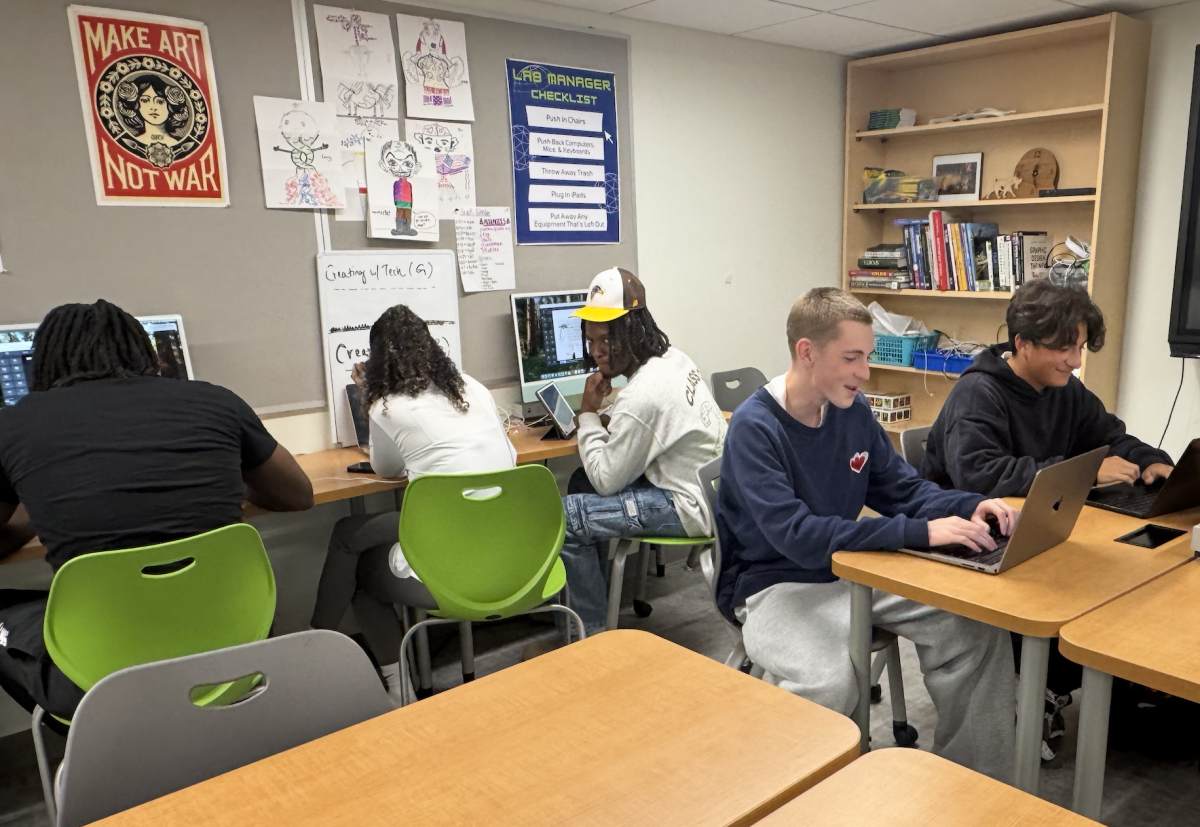In a world where over 70% of America’s 30,000 high schools offer at least one Advanced Placement (AP) course, and AP discourse dominates many elements of the college admissions process, the absence of AP courses at any given high school can raise questions.1 The question of why Friends Select doesn’t offer them is one that many are curious about as it highlight’s our school’s ethos and educational philosophies.
Since the College Board started it in 1955, the AP program has allowed high school students to gain exposure to college material and earn college credit based on their performance on the AP Exam.2 When the AP program gained popularity throughout the late 20th century, student performance in the program became an important factor in college admissions decisions worldwide.3 Despite the benefits of the AP program, not all schools are structured in a way that can appropriately accommodate it, and it is notably absent at Friends Select.
AP courses cover considerably more content than many classes offered at FSS, which would present challenges for its implementation here. The larger, more difficult body of coursework would require a significant change in attitude toward academics by students and teachers, and teachers would have to teach to a much less flexible curriculum. Additionally, the benefits of an AP program at Friends Select may be limited because students are already performing well on AP exams, and there does not seem to be an overwhelming student interest for AP classes.
The typical AP course, modeled after introductory college classes, defines a much broader curriculum than what many at FSS are used to handling every year, so accommodating it would require a significant cultural change in the Upper School.4 At FSS, classes only meet three times a week in blocks of 45 and 70 minutes, which some would argue may not be enough time to accommodate a more extensive curriculum like AP. “[Classes] would have to meet more frequently. We’ve met more frequently in the past, but that change is a big discussion, and [the school would have] to philosophically agree,” Ralph Reinwald, US Math Teacher and Math Department Chair, said.
To make the scheduling work, the administration would likely have to take time away from valued Friends Select traditions like community time, break, and our long lunch break. Such a decision would likely be unwelcome to both faculty and students. “I think not offering APs is better for our curriculum and community. I also think that there is a culture surrounding APs of over-competitiveness, and I’d rather Friends Select have less of that energy,” Patrick Ryan ‘24 said.
To teach an AP course, teachers must adhere to a relatively strict schedule regarding what they teach and when. Before any course can be labeled “AP,” schools must submit an AP Course Audit, which confirms that teachers have read the AP guides for their respective courses and are aware of the course and exam materials.5 While the audit doesn’t formally or automatically impose a hard-set curriculum, it is at least partially implied, given that a good performance on the AP exam, which the course materials are based on, is often the goal of taking the class.
Major changes to AP syllabi are also disincentivized; teachers who submit their own syllabus may have to wait up to eight weeks to hear back from the College Board, while those who submit the College Board unit guides or sample syllabus receive instant approval.6 “We think that AP courses are restrictive in what you can teach. In AP Bio, I would have to complete certain labs and certain topics, and I have to do them by a certain date, preventing me from digging deeper in areas of interest. Ideally, we would hope teachers to feel passionate about what they are teaching and utilize available AP material when appropriate, ” Natalie Mayer, US Advanced Biology Teacher and Dean of Academics, said.
This problem is especially prominent in more expansive classes like English Literature and History, which may seek to cover very different material and be taught differently than their AP equivalents. “[FSS] is a place where we want all voices to be included. This inclusivity can add a richness to the learning experience, which is especially valuable in discussion-based classes.” Suzanne Morrison, US English Teacher and English Department Chair, said. Suzanne specifically mentioned that “the FSS English curriculum prepares students to be able to take the AP English Literature and Composition class, but that the AP English Language and Composition course has a very specific, rhetoric-based curriculum and as such, the class would have to be taught to the test, which becomes rigid and limiting.”
Recognizing that the primary, stated goal of the AP program is to prepare high schools by exposing them to introductory college material and to earn college credit through exam performance, it is evident that students at Friends Select are succeeding on AP Exams even without having access to the course, meaning that the benefit of an AP program at Friends may have a low ceiling.7 According to an April 26th of the Upper School, 5 of 73 respondents have taken at least one AP exam, and all of those students received a score of 4 or higher. For science and math, whose curriculums naturally vary less than English and history, much of the AP curriculum is already covered. “If it were up to me, I wouldn’t implement an AP program. Our [calclulus] textbook covers AP material, and students can work at their own pace if they want to and their math teachers are available to help and give direction,” Ralph said.
Teachers are also more than willing to help by offering more materials to students interested in taking the AP exam. “The AP exams I’ve taken have been successes only due to the consistent help from the teachers at FSS. They provided me with practice problems, videos, and reading material. They’ve all been willing to talk to me about the exam and have done a good job balancing that material with the rest of the class,” Daniel Albarouki ‘24 said.
Despite the popularity of AP courses throughout the country, we should understand that they are not the only method of advanced learning, and Friends Select can and should pursue other methods that push its students and align with its educational identity. Earlier this year, I argued in The Falcon that FSS ought to further develop its advanced classes, and those arguments remain relevant. In the same Upper School survey, 56.2% of 73 respondents indicated that FSS should offer AP courses, showing plenty of student interest in more rigorous courses (and some of the other 43.8% may feel the same, but not for AP courses specifically). By offering new ways to challenge students, Friends Select can take advantage of existing student interests while minimizing the cultural effects that offering AP courses may have.
While the intellectual and collegiate benefits that may come from an AP program are noteworthy, its implementation would be challenging given that its rigid curriculum clashes with the Friends Select Upper School’s educational and day-to-day philosophy, which emphasizes flexibility and holistic education. Rather than falling in line with most of America’s high schools, Friends Select can explore alternative ways of challenging its students by expanding its system of advanced classes and continuing to foster independent student interests.
Bibliography
College Board, “About AP Course Audit,” College Board, accessed May 2, 2024, https://apcentral.collegeboard.org/courses/ap-course-audit/about.
College Board. “AP at a Glance.” College Board. Accessed May 2, 2024. https://apcentral.collegeboard.org/about-ap/ap-a-glance.
College Board. “How AP Course Audit Works.” College Board. Accessed May 2, 2024. https://apcentral.collegeboard.org/courses/ap-course-audit/about/how-it-works.
College Board, “Learn about the AP Program,” College Board, accessed May 17, 2024, https://bigfuture.collegeboard.org/plan-for-college/stand-out-in-high-school/learn-about-the-ap-program#:~:text=Prepare%20for%20the%20Future%3A,%2C%20in%20college%2C%20and%20beyond.
Imed Bouchrika, “Number of Public Schools in the US: Key 2024 Data on States & Demographics,” Research.com, last modified 2024, accessed May 2, 2024, https://research.com/universities-colleges/number-of-public-schools-in-the-us; Ileana Najarro, “How Many AP Classes Are Enough? What Researchers (and College Hopefuls) Say,” EducationWeek, https://www.edweek.org/teaching-learning/how-many-ap-classes-are-enough-what-researchers-and-college-hopefuls-say/2023/10.
Saul Geiser and Veronica Santelices, “The Role of Advanced Placement and Honors Courses in College Admissions,” eScholarship, last modified 2004, accessed May 2, 2024, https://escholarship.org/uc/item/3ft1g8rz.
Suneal Kolluri, Stephanie Owen, and Jack Schneider, “Rethinking the goals of high school rigor: Three experts weigh in on the AP program and College Board,” Brookings, last modified April 11, 2023, accessed May 2, 2024, https://www.brookings.edu/articles/rethinking-the-goals-of-high-school-rigor-three-experts-weigh-in-on-the-ap-program-and-college-board/#:~:text=Now%2C%20with%20AP%20courses%20in,at%20least%20one%20AP%20course































